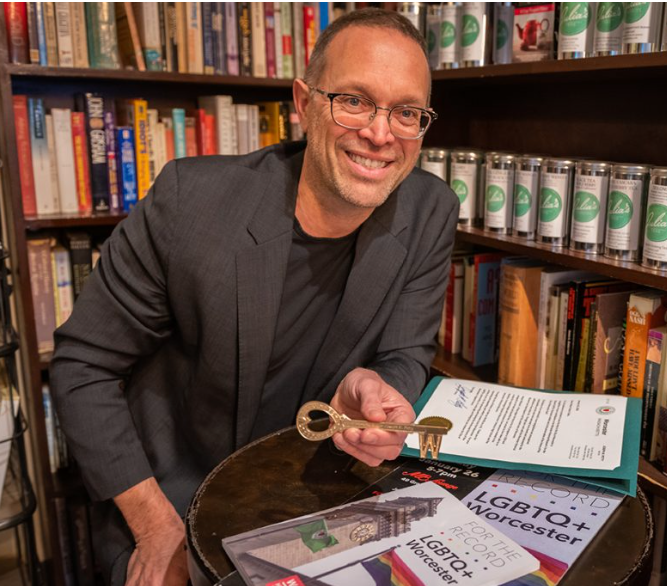Clark professor Bob Tobin, known for chronicling Worcester area's LGBT history, dies at 60

WORCESTER — Clark University professor Robert Deam Tobin — or Bob for those a bit more familiar — known for his work in LGBT studies and European cultural studies, died last week. He was 60.
The Henry J. Leir Chair in Language, Literature and Culture and resident Eurovision expert left a lasting impact not only on the Clark community but Worcester overall, with contributions such as documenting LGBT history in the county, for which he was awarded a key to the city.
"What stood out for me was his humanity and care for others. He was an understated leader and a role model that led by example," said Sebastián Royo, provost and vice president for academic affairs at Clark. "He was a deeply caring individual who left an imprint in any person he would connect with because we could all see that he really cared."
Having grown up in Eugene, Oregon, Tobin moved to Cambridge to study German literature at Harvard University. During his junior year, he attended the Ludwig-Maximilians-Universität in Munich before graduating with his A.B. from Harvard College.
He went on to receive an M.A. and Ph.D. in German literature from Princeton University in 1987 and 1990 respectively, having spent two years of his dissertation at Albert-Ludwigs-Universität in Freiburg.
He arrived at Clark in 2008, where he would eventually work with Rox Samer, assistant professor of screen studies, who not only shared common expertise in queer studies but was also from the same hometown, neighborhood and high school.
"Bob built community that extended beyond the walls of the classroom or the Zoom meeting, that brought together friends and colleagues who shared commitments to making the world a better place, a more just place and a more beautiful place," Samer said. "Even as the people around him often struggled to see eye to eye, he saw the best selves in each of us and encouraged those selves to flourish."
Helping others 'feel at home'
Samer said Tobin was often the first person to not only make them feel "at home" at Clark but also many other people around the campus.
He would invite colleagues over for dinner or one of his "famous parties" with his husband, Ivan, where they would discuss different topics, like European art and culture, politics or religion.
One of those dinner guests was Royo, who said that Tobin was the first person to invite him over for dinner when he started at Clark over a year ago.
The two quickly found shared interests in many of the same topics, marking the start of "an inspiring relationship."
"He had a profound cultural sophistication and an admirable passion for other cultures," Royo said. "And he was a lot of fun! For all that and so much more, he was beloved and admired by so many of us, and he will be desperately missed."
He took his scholarly contributions around the world, leading to interviews with the press and media about his expertise, particularly surrounding Eurovision.
"I remember he was in Italy in late spring attending the Eurovision music festival, and we connected several times by Zoom," Royo said. "He was having such a blast that I joked to him that I did not understand how that could be considered work and we were paying him to do it!"
Tobin was passionate about Clark and deeply committed to his students, whom he was proud of, Royo said.
"He was a demanding professor committed to his students’ learning, but he was also very popular because he cared about his students and they recognized it and appreciated it," he said. "He would also go to any length to help and support them."
Distinguished guests at classes
Students were often treated to guests, including scholars, artists and activists, for visits to their classes.
"Each visit was more than an academic talk; it was a point of departure. He brought distinguished visitors into his undergraduate classes, where it was a student who would make the official welcome and introduction," said Meredith Neuman, associate professor and chair in the English department at Clark.
Guests would often find themselves getting photographed by Tobin with the Sigmund Freud statue on campus.
"There is something absolutely delightful in the pictures he recorded of academic superstars, some of the most distinguished scholars in their fields, hamming it up in front of the Freud statue," she said. "Some people peer into the book he is holding, while others lay down on the bench with their head almost in the lap of the father of psychoanalysis."
Neuman said that, although Tobin himself would not appear in the photos, instead being the one behind the camera, the different poses the scholars would choose would show his "signature style."
"He could find whimsical joy in the most erudite ideas, and draw profound truths in the most frothy examples of popular culture," she said.
This article originally appeared on Telegram & Gazette: Clark University professor Bob Tobin know for LGBT studies dies at 60.

